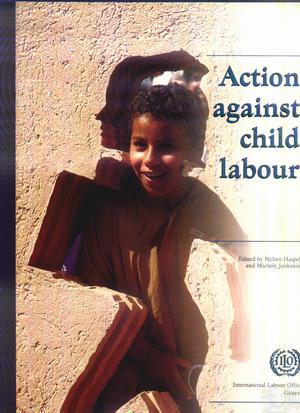Action aganist child labour
İÇİNDEKİLERCONTENTSPREFACE................. LIST OF BOXES LIST OF CHARTS National policies and programmes Guy Thijs INTRODUCTION 1.1 STRATEGIC ACTION AGAINST CHILD LABOUR The problem ............................................................................................................... Prevention, removal and rehabilitation ................................................................... Priority target groups ................................................................................................. Phased and multi-sectoral strategy.......................................................................... 1.2 DEVELOPING POLICIES AND PROGRAMMES ON CHILD LABOUR Why a policy on child labour? ................................................................................... Policies, programmes and projects........................................................................... ILO standards and action through IPEC ................................................................ The first steps in policy and programme formulation............................................ 1.3 SETTING PRIORITIES FOR ACTION Especially vulnerable groups .................................................................................... Main policy and programme directions ......................................................... . Direct action and capacity building................................................................. ... 1.4CREATING A BROAD SOCIAL ALLIANCE Appendix 1.1 Terms of reference for a comprehensive report on child labour ............. Appendix 1.2 Ideas for group work in national planning workshops on child labour Appendix 1.3 Example of a national plan of action on child labour, Cambodia, 1997 Appendix 1.4 Pointers to project design .................................................................................... Towards improved legislation Michele Jankanish INTRODUCTION 2.1 LEGISLATION AND THE FIGHT AGAINST CHILD LABOUR 2.2 SOURCES OF LAW ON CHILD LABOUR 2.3 INTERNATIONAL LABOUR STANDARDS AND NATIONAL LEGISLATION Introduction ......................................................................................................... National policy ...................................................................................................... Coverage of the law (scope of application) ..................................................... General minimum age for admission to employment or work .................... Minimum age for light work .......................................................................... Minimum age for hazardous work ...................................................................... Conditions of employment .............................................................................. Forced labour ........................... .................................................................. Enforcement...................................................................................................... 2.4 NEW INTERNATIONAL LABOUR STANDARDS ON THE WORST FORMS OF CHILD LABOUR 2.5 OTHER INTERNATIONAL TREATIES 2.6 INITIATIVES TO IMPROVE CHILD LABOUR LEGISLATION 2.7 LESSONS LEARNED Checklist 2.1 Checklist 2.2 Checklist 2.3 Checklist 2.4 Appendix 2.1 Appendix 2.2 Appendix 2.3 Appendix 2.4 Appendix 2.5 General principles......................................................................... .. Improving national legislation............................................................................ Legislation on bonded labour........................................................................... Involving employers' and workers' organizations, and others................... ILO Conventions on child labour and forced labour (as at 31 July 1999) Minimum ages in ILO Conventions................................................................ Ratification of ILO Conventions on child labour and forced labour (as at 31 August 1999) Chart of ratifications of ILO Conventions on child labour and forced labour by country (as at 31 August 1999) Excerpts from selected ILO standards on child labour Improving the knowledge base on child labour Kebebew Ashagrie INTRODUCTION 3.1 CHILD LABOUR STATISTICS: METHODOLOGICAL CONSIDERATIONS Data requirements ....... Survey methodologies BASIC RESULTS 3.2 Household survey.......... Establishment survey.... Survey of street children The time-use approach... 3.3 RECOMMENDATIONS ON CONDUCTING SURVEYS Household-based surveys........................................................................................... Surveys of employers (establishments or enterprises)............................................ Surveys of street children ............................................................................................. 3.4 RECOMMENDATIONS FOR INTERVIEWING CHILDREN Creating the right setting.............................................................................................. 3.5 FURTHER RESEARCH Appendix 3.1 List of detailed variables in child labour surveys........................................... Bibliography on child labour surveys, statistics and related matters.................................................... 4 Alternatives to child labour Nelien Haspels, Feny de los Angeles-Bautista and Victoria Rialp INTRODUCTION 4.1 STRATEGIES IN EDUCATION Educating children about their rights and about child labour issues Investment in early childhood development programmes ...................................... Increasing access to educations Improving the quality of formal and non-formal education................. Non-formal education as an entry, a re-entry or alternative for (former) working children ........................................................................................................... Approaches to vocational education ....................................................................... 4.2 PREVENTION AND REHABILITATION PROGRAMMES FOR CHILDREN FROM ESPECIALLY VULNERABLE GROUPS Child victims of bondage, commercial sexual exploitation and trafficking .......... Girls ............................................................................................................................... A Children living and working on the streets................................................................ Children of indigenous groups and other minorities ............................................... 4.3 EDUCATION PROGRAMMES AND INCOME OPPORTUNITIES FOR PARENTS_____________________________ 4.4 WORKPLACE AND COMMUNITY MONITORING_________ 4.5 LESSONS FROM EXPERIENCE: PLANNING ACTION PROGRAMMES Identifying priority target groups ............................................................................. Concerted action.......................................................................................................... Setting programme objectives................................................................................... Checklist 4.1 Identifying target groups and selecting children............................................ Checklist 4.2 Planning vocational skills training programmes ........................................... Checklist 4.3 Measuring the impact of action programmes................................................. 5 Strategies to address child slavery Michel Bonnet, Hirak Ghosh, Victoria Rialp and Pin Boonpala 5.1 THE PROBLEM OF CHILD SLAVERY The nature of the problem ...................................................................... The extent of the problem ...................................................................... 5.2 INTERNATIONAL ACTION AGAINST CHILD SLAVERY International Labour Organization ............................................................ United Nations...................................................................................... ..... 5.3 NATIONAL LEGISLATION AND ENFORCEMENT Legislation prohibiting forced and bonded labour........................ Problems in enforcement................................................................. 5.4 ACTION AT THE NATIONAL LEVEL Preventing child slavery.............................. Action against slave owners...................... Targeting children in bondage.................. Integrated action to address child slavery. 5.5 DEVELOPING COMPREHENSIVE PROGRAMMES OF ACTION Strategy for action against child bondage................................................................ Strategy for action against child trafficking and the commercial sexual exploitation of children.............................................................................................. Bibliography on child slavery........................................................................................................................... 6 Strategies for employers and their organizations Amanda Tucker INTRODUCTION 6.1 STRATEGIES FOR EMPLOYER ACTION Planning for action at the national level ......................... Building alliances ............................................................ Key issues in project design ............................................ Ten steps to enhance employer action on child labour 6.2 EMPLOYER "BEST PRACTICES" ON CHILD LABOUR Awareness-raising and policy development initiatives ...................... Employer action to combat child labour in specific sectors .............. Direct support for the removal and rehabilitation of child workers , 6.3 CORPORATE INITIATIVES ON CHILD LABOUR Labelling or certification schemes..................................................... Corporate codes of conduct............................................................... Industry codes of conduct................................................................................. IOE views on voluntary codes of conduct and labelling.................................. 6.4 KEY LESSONS FOR FUTURE ACTION Appendix 6.1 IOE General Council Resolution on Child Labour................................. 7 Trade unions against child labour Satoru Tabusa INTRODUCTION 7.1 WHY CHILD LABOUR IS A TRADE UNION ISSUE The history and role of trade union involvement............................................ 7.2 HOW TRADE UNIONS ARE FIGHTING CHILD LABOUR Trade unions strengthen their capacity to address child labour issues............ Trade unions support children, their families and communities .................... Trade unions raise awareness on child labour issues......................................... Trade unions gather and disseminate data on child labour .............................. Trade unions include child labour concerns in collective bargaining agreements........................................................................................................... Trade unions advocate for codes of conduct..................................................... Trade unions work in partnership with NGOs, employers' organizations and governments .................................................................................................. The international trade union movement plays a major role ........................... 7.3 WHAT A TRADE UNION CAN DO Ten-point action guide................................................................................ Bibliography on trade union action ....................................................................................... 8 Awareness-raising Sherin Khan INTRODUCTION Aspects of communication................................................................................. Process of communication............................................................................... 8.1 THE MESSAGE "Action against child labour can be taken now" "Prioritize the most harmful, often invisible forms of child labour"............ "Positive action and international cooperation are needed" "Tradition cannot justify the exploitation of children" ................................... "Prevention is better than cure" 8.2 8.3 THE AUDIENCE MEANS OF COMMUNICATION 8.4 THE NEED FOR A COMMUNICATION STRATEGY Appendix 8.1 Informing the public...................................... . Appendix 8.2 Popular theatre as an effective communications tool..................... 9 Action by community groups and NGOs Pin Boonpala 9.1 _CIVIL SOCIETY ORGANIZATIONS AND CHILD LABOUR 9.2 PRACTICAL EXPERIENCE OF NGOs IN COMBATING CHILD LABOUR____________________________ Types of NGO action Examples of NGOs in action................................................................... 9.3LESSONS LEARNED________________________ 10 Resources on child labour INTRODUCTION_____________________________________ 10.1 GENERAL PUBLICATIONS ON CHILD LABOUR_______ ILO reports for the International Labour Conference (ILC) and Governing Body (GB).................................................................... ........ Reports of the International Programme on the Elimination of Child Labour (IPEC) ............................................................................................. Policy studies.......................................................................................................... Information kits, training manuals and guidelines....................................... . Audiovisual materials.............................................................................................. 10.2 SPECIAL THEMES    |



